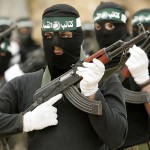Israel-Palestine: The Hamas Factor
 Friday, August 27, 2010 at 9:13
Friday, August 27, 2010 at 9:13  First, Hamas accused its rival Palestinian party, Fatah, of “waging war on Islam and Allah” by detaining and firing hundreds of imams and shutting down hundreds of centers for teaching the Koran in the West Bank". Then, last Sunday, it postponed a meeting with Fatah indefinitely, due to the Palestinian Authority's decision to enter direct talks with Israel.
First, Hamas accused its rival Palestinian party, Fatah, of “waging war on Islam and Allah” by detaining and firing hundreds of imams and shutting down hundreds of centers for teaching the Koran in the West Bank". Then, last Sunday, it postponed a meeting with Fatah indefinitely, due to the Palestinian Authority's decision to enter direct talks with Israel.On Tuesday, Hamas' exiled leader Khaled Mashaal said that direct talks are "illegitimate" and are "the result of coercion by Washington". He called on Fatah to "wake up" and added: "Do not allow for these adventures and sins to take place under your name."
Middle East Inside Line: “Warm” Turkish-Israeli Relations; Latest on Israel-Palestine Talks
Meshaal also called on Cairo and Jordan to "boycott" the negotiations: "The results of these negotiations will be catastrophic for the interests and the security of Jordan and Egypt."
On Wednesday, while Hamas detained four members of the rival Islamic Jihad, a source told Haaretz that the Palestinian Authority has arrested dozens of Hamas and Islamic Jihad militants in the West Bank over the past two weeks. In a contrasting sign, Gaza's sole power plant, generating 25% of the electricity for the area, was reactivated after Hamas rulers reached agreement on fuel payments to Ramallah.
Despite all these developments, no one is mentioning Gaza and Hamas ahead of the beginning of the direct talks between the Israeli Government and the Palestinian Authority. Reuters' Douglas Hamilton points to the "ghost at the Mideast banquet":
Even if Israel and the Palestinians can scale a mountain of skepticism and reach a peace treaty in the next 12 months, 40 percent of Palestinians would be part of it in name only, because they live in the Gaza Strip.
Gaza's Islamist Hamas rulers say they will never give Israel what it most wants from a Middle East deal, which is recognition of the Jewish state and a legitimate place in the Middle East.
A settlement to "establish a Palestinian state in the West Bank and Gaza," as key texts have put it for 20 years, would start life with a fictional element. As things stand now, about 1.7 million Palestinians would be excluded from statehood.
So, what can be done? One option is an Israeli reoccupation of Gaza; in contrast, Hamas could be recognised and invited to the negotiations in Washington. The first possibility would not only discredit Israel in the eyes of the international community but would double violence against West Jerusalem. The second possibility cannot be tolerated by West Jerusalem, given the social and political situation in Israel, and the Palestinian Authority will not be receptive.
Daniel Byman puts forth an intermediate option:
If Hamas cannot be uprooted, it might be convinced to not disrupt peace talks with violence and tone down its rhetoric. In order for Hamas to want a lasting cease-fire, Israel and its allies must change the organization’s decision-making calculus — a process that will require both incentives and threats.
One way to go about this would be for Israel to allow the regular flow of goods into Gaza with international, rather than Israeli, monitors manning the crossing points. Israeli intelligence would still watch what goes in and out to ensure that the monitors did their job, but symbolically the switch would be important.
In exchange, Hamas would commit to a lasting cease-fire and agree to stop all attacks from the territory under its control. Hamas would also close the tunnels and end its smuggling.
Such a deal would allow Hamas to claim credit for improving the lives of Gazans, and it could use the resulting increase in the flow of goods to reward its supporters. For Israel, the regular rocket attacks would come to a complete halt and the threat of renewed attacks would diminish.
This still appears to be wishful thinking. Hamas' priority is not to increase its per capita GDP and become a financial rival of the West Bank. Whatever the economic progress, the Gazan leadership would risk the appearance of being no more than a complementary organisation to Fatah. Instead, Hamas needs its social organisations to obtain as much support as possible from Gazans, in the face of "difficulties", to position itself as preferable to Fatah.
Handing the reins to an international organisation would also raise issues for Hamas, notably over its "transparency" on political and economic areas, and it would take away one of its biggest political weapons --- its claim of insufficient aid for Gazans --- used for the "legitimisation" of its struggle against Israel.
Nor should one expect Hamas to be silent over the prospect of direct talks with a lasting cease-fire. Such a peace agreement could herald the the hardest days for the organisation as it positioned itself both against Israel and against the Palestinian Authority and Fatah.
So, what is left? Hamas will settle for no less than political recognition. If that is not possible in the short term, because of Israel's internal position as well as negotiating stance, then it must be envisaged further down the road. Hammering Hamas after an Israel-Palestinian Authority peace agreement is far more risky than putting in effort for a Hamas-Fatah agreement for a single body representing Palestinians. Only then, can there be a Palestinian leadership with a stronger position, with more acceptance of its legitimacy, both in the eyes of Palestinians and of the rest of the world.
So, if the short-term answer to the "Hamas factor" is No Dialogue Now, that cannot stand --- provided one is looking for stability --- for No Dialogue Later.


